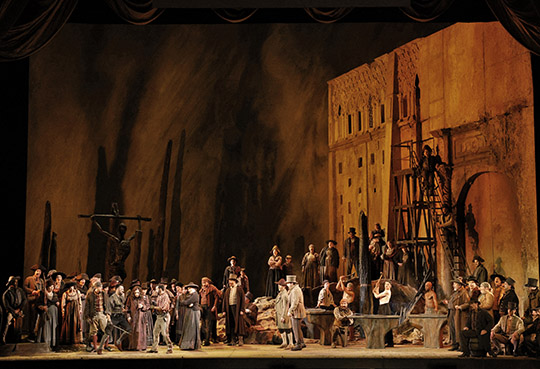The San Francisco Opera opened its 101st season with Verdi's Il Trovatore, an enormously popular opera since its 1853 debut. It's a tricky piece to pull off in the 21st century for a number of reasons. Verdi wrote extremely demanding music for the four greatest singers of his time, and since then just about every legendary soprano, tenor, baritone and mezzo-soprano have embodied the roles, which sets a seriously high bar. (The program has a lovely article by Jeff McMillan of a few of the greats who have triumphed at the San Francisco Opera in the roles over the last century.) Then there is the matter of the bloodthirsty, coincidence-ridden, passionately Romantic narrative based on a hit Spanish play from the 1830s, which can easily tip into utter absurdity. (All production photos by Corey Weaver.)
I saw the penultimate performance of the run on Friday night, and was reminded again how great this musical score can be. Music Director Eun Sun Park is still figuring out her way with the composer and the result was a bit tighter and less flowing than the best Verdi conducting, but there were glimmers of brilliance throughout. The chorus, under new Chorus Director John Keene, sounded as good as I have ever heard them, which is a wonderful sign of things to come.
Though none of the four principal singers from this production are going to be in any future recap of Legendary Performances in SF Opera programs, they were all very good. Baritone George Petean as the Count di Luna had a voice that was easy and confident in the role, although his characterization was a one-note, moustache-twirling, dastardly villain who wants to kill the hero and ravish the heroine. It's hard to say whether this was the decision of the singer or the director.
Mezzo-soprano Ekaterina Semenchuk as Azucena gave one of prettiest, most accurate renditions of her role musically I have ever heard. However, she did little histrionically with one of the juiciest roles in all of opera, a gypsy (Roma) woman who starts half insane in her opening scene and only becomes more poignantly detached between past and present over the course of the opera.
As her (adopted) son Manrico, Arturo Chacon-Cruz has a really lovely tenor but this role felt a bit too big and demanding for his voice. Thankfully, instead of pushing, he would occasionally pull back and become part of the larger ensemble.
Il Trovatore was written around the same time as Rigoletto and La Traviata and I think my favorite heroine of the triology is Leonora, who pushes back and fights for her love throughout, unlike the pathetic Gilda and self-sacrificing Violetta. Soprano Angel Blue is gorgeous in the role, dramatically and vocally, except for her high notes which were loud when they should have been soft and dreamy.
The David McVicar production, with its Goya-inspired design on a well-conceived turntable set by Charles Edwards, works really well. When it appeared in San Francisco in 2009, it was the first time Il Trovatore made any kind of geographical and dramatic sense to me. This second outing 14 years later has been restaged by a house director, and feels somewhat inert and less tightly dramatic than previously, but it doesn't matter. The music here is the thing.








No comments:
Post a Comment